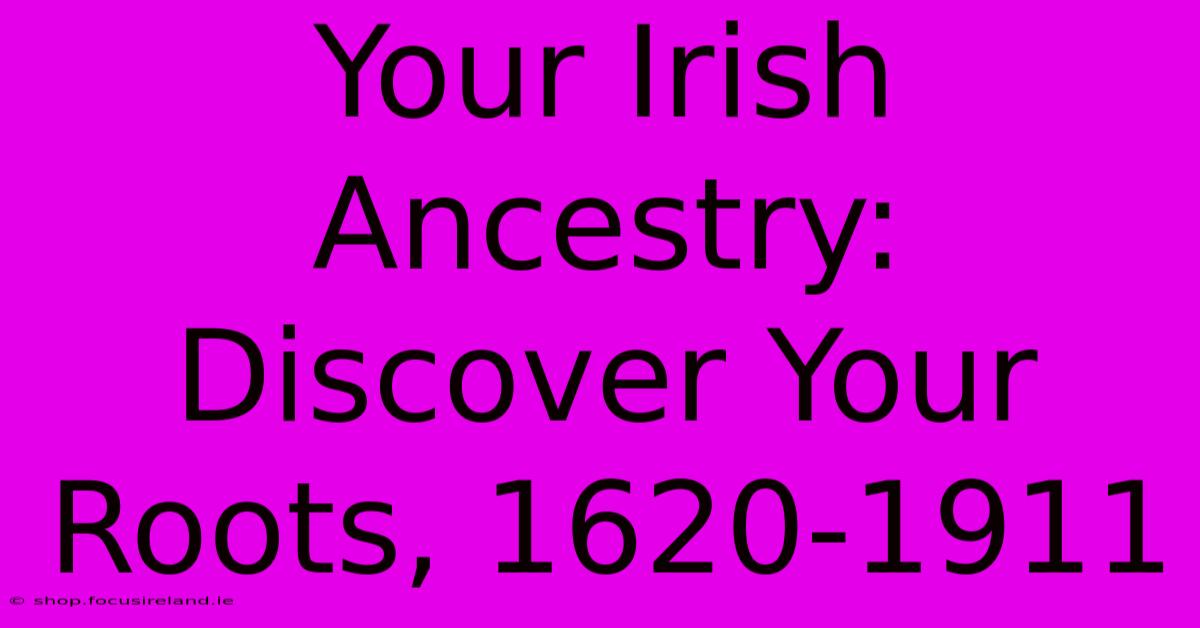Your Irish Ancestry: Discover Your Roots, 1620-1911

Table of Contents
Your Irish Ancestry: Discover Your Roots, 1620-1911
Uncover the captivating story of your Irish ancestors! This period, spanning from the early 17th to the early 20th century, witnessed immense social, political, and economic upheaval in Ireland, significantly impacting family histories. Tracing your roots back to this era requires dedication, but the rewards—a deeper understanding of your heritage and a connection to the past—are immeasurable. This guide will equip you with the knowledge and resources to embark on your Irish ancestry journey.
Understanding the Historical Context (1620-1911)
The period 1620-1911 encompasses crucial moments in Irish history, profoundly influencing family records and migration patterns:
The Plantation of Ulster (early 17th century): This period saw significant English and Scottish settlement in Ulster, resulting in complex family lineages and potential record variations.
The Great Famine (1845-1849): This devastating event led to mass emigration from Ireland, with millions seeking refuge in North America, Australia, and elsewhere. Tracing your ancestors through this era requires careful consideration of emigration records.
Land Reform and Political Upheaval (late 19th and early 20th centuries): These turbulent times often led to changes in land ownership, impacting the availability of records. The fight for Irish Home Rule also played a significant role in shaping family histories.
Key Resources for Tracing Your Irish Ancestry
Successfully navigating your genealogical research requires accessing the right resources. Here are some vital tools:
Civil Registration Records: These records, starting in 1864 for births, marriages, and deaths, are invaluable. They provide concrete details about your ancestors, including names, dates, and locations. Remember to search multiple locations if you suspect your ancestors moved around.
Church Records: Prior to 1864, church records are crucial. These records, kept by the Catholic, Church of Ireland, and Presbyterian churches, often contain baptismal, marriage, and burial details, dating back centuries. Access to these records may require contacting local parishes or dioceses.
Census Records: Irish census records provide snapshots of family life at various points in time. They can offer invaluable information about occupation, address, and family members. Remember that census records weren't taken every year.
Land Records: Land ownership records can provide insights into your ancestors' social standing and property holdings. These can be particularly helpful in piecing together family histories in rural Ireland.
Emigration Records: If your ancestors emigrated from Ireland, passenger lists are invaluable. These records detail the ship's name, departure and arrival ports, and passenger manifests. Numerous online databases offer access to these records.
Tips for Effective Research
- Start with what you know: Begin with your immediate family and work backward, gathering as much information as possible.
- Be methodical: Keep detailed records of your research, including sources and dates.
- Utilize online resources: Many websites offer access to Irish genealogical records.
- Don't be afraid to ask for help: Genealogical societies and online forums can provide invaluable assistance.
- Consider DNA testing: DNA testing can help confirm family connections and uncover unexpected ancestral links.
Overcoming Common Challenges
Tracing Irish ancestry often presents unique challenges:
- Record variations: Spelling inconsistencies and variations in naming conventions can make finding records more difficult.
- Gaps in records: Unfortunately, records are not complete for every time period and location. Persistence and exploring alternative resources are key.
- Language barriers: Many older records are written in Irish Gaelic, requiring translation skills or assistance.
Connecting with Your Heritage
Uncovering your Irish ancestry is more than just tracing names and dates; it's about forging a connection with your past. The journey may be challenging, but the rewards – a deeper understanding of your family history and a richer sense of identity – are truly profound. Embrace the process, and enjoy the discovery of your remarkable Irish roots!

Thank you for visiting our website wich cover about Your Irish Ancestry: Discover Your Roots, 1620-1911. We hope the information provided has been useful to you. Feel free to contact us if you have any questions or need further assistance. See you next time and dont miss to bookmark.
Featured Posts
-
The Ultimate Guide To Irelands May Weather
Mar 26, 2025
-
Irelands Most Affordable Counties For Families
Mar 26, 2025
-
California To Ireland The Complete Time Zone Guide
Mar 26, 2025
-
Book Your Dream Cork B And B Today
Mar 26, 2025
-
Know Before You Go Galways Current Time
Mar 26, 2025
